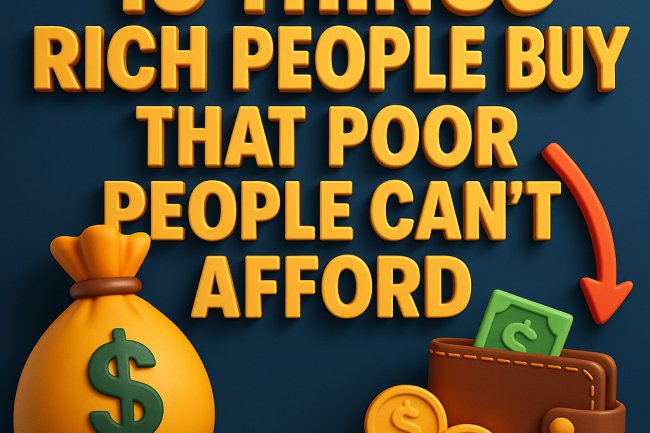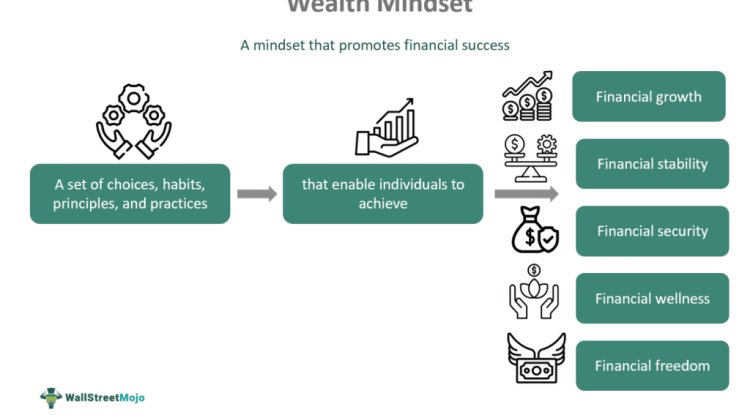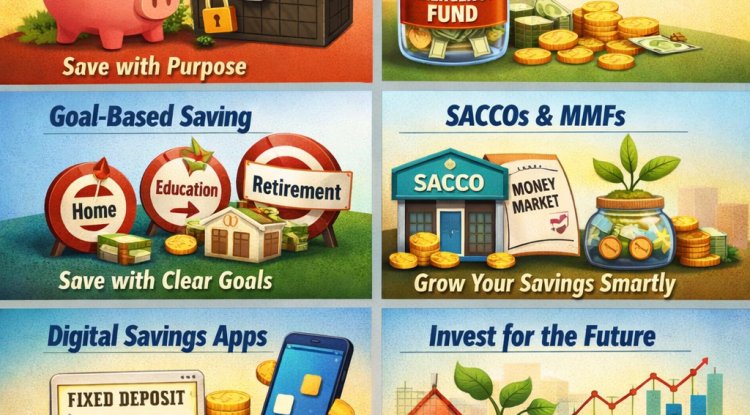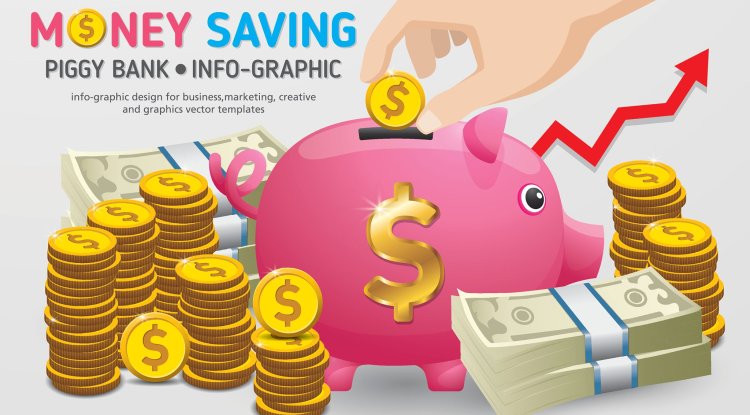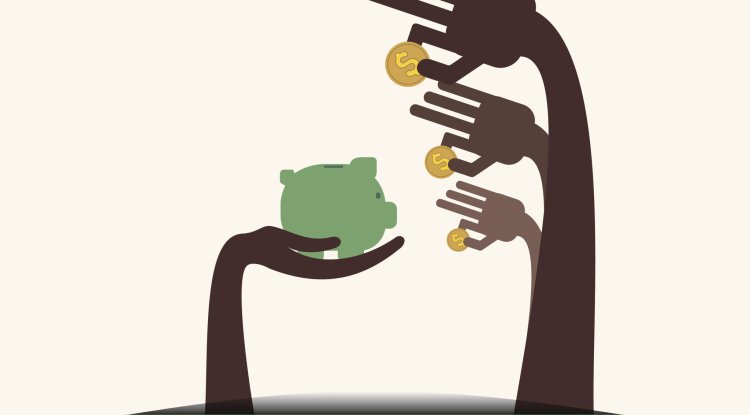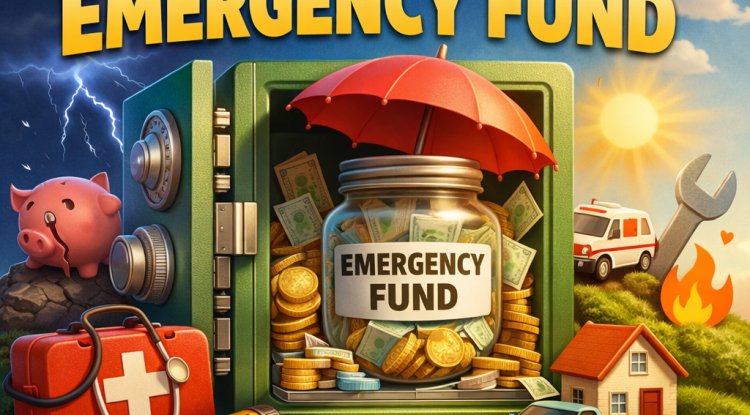From Paycheck to Paycheck: Breaking the Cycle Forever
Stop surviving and start thriving. Discover expert strategies to break the paycheck-to-paycheck cycle and build lasting wealth—globally and in Africa.
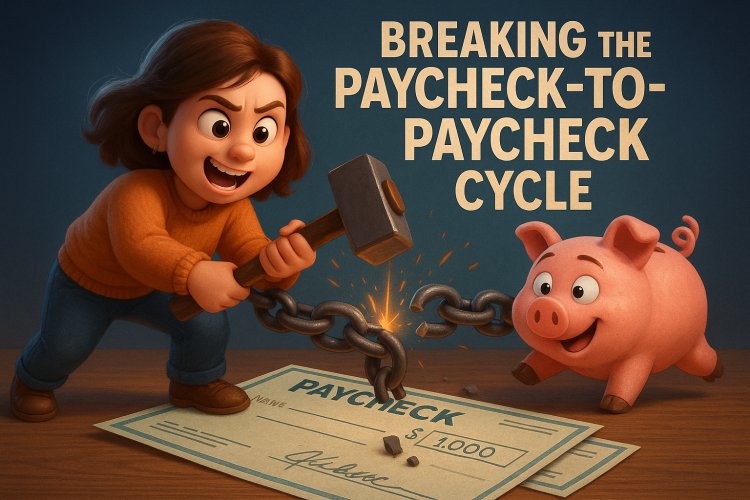
From Paycheck to Paycheck: Breaking the Cycle Forever
I know the paycheck-to-paycheck grind all too well. Early in my career, I remember counting down the days to payday with anxiety. My rent was due, the fridge was empty, and any unexpected expense (even a broken laptop charger) felt like a crisis. I wasn’t alone—far from it. In fact, about 67% of people in 2025 are living paycheck to paycheck according to a recent report investopedia.com. That statistic includes young professionals in Nairobi and Lagos, freelancers in Johannesburg, even some high earners in New York. It’s a global struggle, and it can steal your peace of mind and limit your future. But here’s the good news I learned through experience: living this way doesn’t have to be forever.
In this guide, I’ll speak to you directly, as someone who’s been there and now helps others break out of the cycle. We’ll uncover the hidden psychological traps that keep us stuck, acknowledge the systemic barriers that make it harder (especially here in Africa), and then lay out practical steps and tools to change your financial life. My tone is first-person and motivational because I want you to feel personally guided. Whether you’re a salaried employee in Nairobi, a freelancer in Lagos, or a recent graduate in Accra, this is about taking charge of your money and your future.
By the end, you won’t just be thinking about surviving until next payday—you’ll be strategizing how to build long-term wealth, freedom, and options for yourself. So, let’s dive in and break this cycle forever.
Understanding the Paycheck-to-Paycheck Trap
Living “paycheck to paycheck” means your income is just enough to cover your expenses until the next pay arrives – with nothing left over. It’s an exhausting cycle of earning and immediately spending. One emergency or late paycheck could spell disaster. Before we jump into solutions, it’s important to understand why so many capable, hardworking people (often including those earning decent salaries) get caught in this trap.
It’s not just about how much you earn. Surprising but true: nearly 60% of people making over $100,000 a year in the U.S. still live paycheck to paycheckbeyondthegreencoaching.com. If earning more automatically fixed the problem, that wouldn’t happen. The reality is the problem isn’t merely income – it’s often the psychology and habits behind how we manage moneybeyondthegreencoaching.com. Of course, external circumstances matter too (low wages, high living costs, etc.), which we’ll address. But first, let’s talk about the mindset traps that might be keeping you stuck in a financial Groundhog Day.
Psychological Traps that Keep You Stuck
Even intelligent and motivated people can fall into mental habits that sabotage their finances. I’ve seen it in clients and experienced some myself. Here are a few common psychological traps when it comes to money:
-
Scarcity Mindset: This is the constant feeling that there’s “never enough” money, which creates anxiety and urgency. Ironically, a scarcity mentality can lead to impulsive spending for instant gratification (“I might as well enjoy this little money now, because I never have enough”) or panic decisions like taking costly loans. As one financial coach noted, the scarcity mindset drives impulsive decisions and overspending on perceived “must-haves” for temporary comfort beyondthegreencoaching.com. It becomes a cycle: you’re always worried about money, so you make short-term choices that keep you living hand-to-mouth.
-
Lifestyle Creep and Social Pressure: When your income increases – even a little – it’s tempting to immediately upgrade your lifestyle. Maybe you move to a pricier apartment in Nairobi once that raise comes, or you start ordering expensive lunch at the office because you feel you’ve earned it. Our society (and social media feeds) also adds pressure to “keep up” – whether it’s wearing the latest fashion, having the nice car, or saying “yes” to every plan with friends. Lifestyle inflation can quietly eat up any extra income, leaving you still broke by month’s end. You might be earning more but spending more just as fast. The trap here is thinking “I deserve this, I make good money now” – which may be true, but not if those expenses undermine your financial security.
-
“I’ll Deal With It Later” (Avoidance): Many people find money matters stressful, so they cope by avoiding looking too closely at their finances. Maybe you don’t budget because it feels tedious or scary, or you ignore the credit card statements stacking up. Denial provides short-term relief (“If I don’t see it, it’s not a problem today”), but it guarantees long-term pain. I’ve met freelancers who had no idea how much debt they’d accumulated because they couldn’t bear to check. Avoidance is a psychological trap that keeps you from breaking the cycle – you can’t fix what you won’t face. An important first step is gently but firmly telling yourself it’s time to open those bills, review that bank statement, and confront reality. Remember, you have to face it to fix it.
-
Borrowing from Your Future: This trap is subtle. It’s when you count on future income to cover today’s spending. For example: assuming next month’s commission or bonus will pay off the credit card you’re maxing out now, or thinking “I can take a loan for this new phone because surely I’ll get a better job soon to pay it off.” It’s essentially betting on the future to rescue your present. If that future money doesn’t come (or is needed for something else), you’ve dug yourself deeper. I call this the “tomorrow will take care of it” mindset, and it’s dangerous. It can lead to mounting debt and disappointment. A personal confession: I once enrolled in an expensive course on my credit card, banking on a freelance project to pay it off; the project fell through, and I was left scrambling. I learned that living within today’s means is safer than praying for tomorrow’s windfall.
-
Shame and Deserving Beliefs: Lastly, our beliefs about what we deserve or feelings of shame can trap us. Some feel they deserve a treat or luxury after working hard – which is fine occasionally, but not if it consistently blows the budget. On the flip side, some people feel a kind of shame or hopelessness, thinking “I’m just bad with money” or “people like me (from my background) can’t get ahead.” Such thoughts can become self-fulfilling. It’s crucial to replace them with an empowered mindset: Yes, I can learn and improve my finances. There is no special gene for money management; it’s a skill anyone can acquire.
How do we break these psychological traps? Start by recognizing them in yourself. I had to be brutally honest with the man in the mirror about my impulse buys and avoidance tendencies. Once you name the habit (“okay, I’m avoiding budgeting out of fear” or “I’m spending to appear successful to others”), you can start changing it. In a later section, we’ll discuss specific techniques like practicing gratitude for what you have (shifts you from scarcity to abundance mindset), and setting up systems that remove temptation (like automatic savings so you don’t see that money to spend).
But before we get there, let’s talk about the external forces at play. If you’re nodding along to the mental traps above, you might also be thinking, “It’s not just in my head; real-world circumstances make it hard to get ahead.” You’re absolutely right. Let’s acknowledge those and see how to navigate them.
Systemic Barriers (and How to Beat Them)
Money doesn’t sit in a vacuum. We operate within economic and social systems that can either help or hinder our financial progress. As a Kenyan financial advisor writing for a global audience, I’m especially attuned to the challenges we face in African countries – but many of these barriers apply worldwide. Here are some common systemic hurdles and some thoughts on overcoming them:
-
High Cost of Living vs. Low Wages: In many places, expenses are rising faster than incomes. Take Kenya, for example: a recent survey showed nearly half of Kenyan households survive on less than KSh20,000 per month (roughly $135) kenyanwallstreet.com. That’s a tight budget for rent, food, transport, school fees – let alone savings. Nigeria tells a similar story; only a small fraction of workers in Lagos earn a comfortable salary forbesafrica.com. When you’re grossly underpaid or prices keep inflating, saving money feels like trying to fill a bucket with a hole in it. What can you do? First, maximize what you do earn (negotiate raises when possible, seek better opportunities, or add side income – more on that later). Second, be extra strategic with the money you have: prioritize essentials and look for creative ways to reduce big costs (for instance, sharing housing, bulk-buying food staples with friends to save, etc.). It’s not fair that we have to do more with less, but taking action beats lamenting the situation. Also, keep upgrading your skills – higher skills can lead to higher pay over time, which helps counteract rising costs.
-
Job Instability and Unemployment: Many young professionals and freelancers deal with irregular income. One month you’re flush, next month nothing. Or you might be between jobs because formal employment opportunities are limited (youth unemployment is a serious issue in Africa). This uncertainty makes it hard to plan. I’ve been a freelancer before – feast or famine is stressful! To cope, treat windfalls carefully: when you have a great month, resist the urge to immediately elevate your spending. Instead, save a chunk of that to cover leaner times (think of it as paying your future self). Also, consider building multiple income streams to cushion job loss – even small side gigs can provide insurance. And remember, an emergency fund is your best friend when income is unstable (we’ll delve into that in the steps section). It creates a buffer so one slow month doesn’t spiral into debt.
-
Lack of Financial Education: Let’s face it – most of us were never taught personal finance in school. You could get a degree in engineering or arts and still have no clue how to file taxes, invest, or budget. That’s a systemic failure of our education systems globally. The result is people entering adulthood financially illiterate, easy prey for consumerism or bad advice. If you feel lost about money management, know that it’s not your fault – but it is now your responsibility to educate yourself. Fortunately, in the internet age, knowledge is everywhere: blogs like this one, YouTube channels, books, workshops (in Kenya, for example, organizations like Centonomy offer personal finance courses). I personally started devouring personal finance books in my mid-20s when I realized I lacked this knowledge. It changed my life. Make it a habit to continuously learn about money – each lesson will empower you to break free of the cycle.
-
Debt Traps and Predatory Lending: When you’re desperate mid-month, it’s easy to fall into the debt trap. Expensive credit is a systemic issue worldwide. In the U.S., it might be high-interest credit cards or payday loans; in Kenya, we have mobile loan apps that lend instantly but at exorbitant rates, or the infamous fuliza overdraft on M-Pesa that many rely on to get to payday. These quick loans can snowball – you borrow to survive, then a big chunk of next paycheck goes to repaying, leaving you short again, and the cycle repeats. Breaking out means being very cautious about taking on new debt. Sometimes a small loan is unavoidable, but make it a last resort, and have a plan for it. Prioritize paying down high-interest debts as fast as possible (we’ll cover strategies like the debt snowball/avalanche in the steps below). Also, seek out lower-cost credit options if you must borrow: for instance, a SACCO loan in Kenya might charge 1% per month (12% annually) which is far friendlier than a mobile loan at 10% per month. If you’re in a community savings group or credit union, leverage those before turning to predatory lenders.
-
Cultural and Family Obligations: In many African families (and elsewhere), there are expectations to support relatives once you start earning. It’s often called the “black tax” – the unspoken duty to help parents, siblings, or even extended family financially. Helping family is a noble responsibility, and I personally believe in giving back. But it can strain your budget if not managed. If you’re the go-to emergency fund for everyone around you, you might never accumulate your own savings. My advice is to include family support as a budget line like any other expense – decide what you can sustainably give, communicate it lovingly but firmly, and stick to it. And whenever possible, teach and encourage financial independence in your family as well. Perhaps help a sibling start a small side business rather than just giving cash regularly. By doing so, you reduce dependency in the long run. Remember, you can’t pour from an empty cup; securing your financial foundation puts you in a better position to uplift others.
-
Inequality and Systemic Bias: I’ll briefly note that factors like gender pay gaps, racial discrimination in hiring or lending, and other systemic inequalities do exist. Women in many countries earn less on average for the same work howmoneyworks.com, and certain communities have less access to capital. These are real barriers that no amount of budgeting genius on your part can completely fix. They require policy changes and collective action. Still, within your sphere, control what you can. Negotiate your salary assertively, support policies and leaders that address these issues, and possibly join professional networks (e.g., women-in-tech groups or entrepreneur forums for youth of color) that help bypass some barriers. Don’t internalize systemic bias as personal failure – you might have to work harder to achieve the same results, which isn’t fair, but acknowledging this can actually free you from self-blame and motivate strategic action.
I bring up these systemic issues because I’ve seen too many “financial gurus” ignore them and just blame people for their money problems. Yes, personal responsibility and good habits are crucial (and we’ll get to those next). But no, you’re not crazy if you feel the economy or system makes it hard – it often does. My message is that despite these barriers, you can succeed. I’ve had clients in Nigeria who started out unemployed and in debt, and five years later bought their first home. I’ve seen single mothers go from struggling to having a solid emergency fund and investments by being persistent and using community support. The climb is harder for some of us, but that just means we have to be smarter and more intentional with our finances.
Now, equipped with an understanding of the mindset pitfalls and the external challenges, let’s move on to what you can do about it. The next section is the action plan – the steps I recommend to break free from living paycheck to paycheck and start building that financial future you dream about.
How to Break the Cycle: Practical Steps to Financial Freedom
Alright, this is where the rubber meets the road. Breaking the paycheck-to-paycheck cycle won’t happen by luck or wishful thinking – it requires deliberate changes in how you handle money. The changes don’t have to be dramatic all at once; even small steps, repeated consistently, will gain momentum over time. I often tell my readers and clients: personal finance is a marathon, not a sprint. Here are the key steps, in a logical order, that can transform your finances:
-
Face Your Finances (Track Every Shilling or Naira): You can’t change what you don’t measure. So the first step is to get a clear picture of where your money is currently going. For one month (or better, a few months), track all your expenses and income. You can use a simple notebook, a spreadsheet, or a budgeting app – whatever you’ll stick with. In Kenya, for example, I’ve had people download their M-Pesa statements or bank statements and categorize every transaction. It can be eye-opening (e.g., “Wow, I spend KSh5,000 on takeout coffee in a month!”). If you’re in Nigeria, maybe you’re seeing those little daily spends on data or airtime adding up. The goal is to identify leaks and patterns. When I first did this, I discovered I was spending 30% of my income on eating out – no wonder I felt broke! Tracking brings awareness, and awareness brings control. This habit of tracking is the foundation for everything that follows.
-
Create a Realistic Budget (and Actually Use It): I know “budget” can sound like a boring or restrictive word, but think of it as your freedom plan. A budget is simply telling your money where to go instead of wondering where it went. Based on the tracking above, set a monthly (or weekly) budget that covers all necessities (rent, food, transport, utility bills, etc.), allocates some money for discretionary fun, and importantly carves out a portion for saving/investment. One popular guideline is the 50/30/20 rule – 50% of income to needs, 30% to wants, 20% to savings/debt payoff – but adjust the ratios to fit your life. The key is to live on less than you earn. When you budget, include a line for “pay yourself first” (more on that soon). Also plan for infrequent expenses (like school fees, annual insurance, or that trip back to the village during holidays) by setting aside a bit each month. Make sure your budget is realistic – if you allocate unrealistically tiny amounts to “groceries” or “transport” just to make numbers fit, you’ll abandon the plan. Start with honest figures and then find where to trim. And once the budget is set, track against it. Apps can help by sending alerts when you near limits, or you can do a weekly check-in yourself. Remember, a budget is a living tool – tweak it as needed, but don’t throw it away at the first slip-up. I promise, after a few cycles, budgeting becomes almost second nature and incredibly empowering.
-
Build an Emergency Fund (Your Buffer against Crisis): If you’ve been living paycheck to paycheck, an emergency fund might sound like a luxury. But it’s actually priority number one once you’ve stabilized your budget. An emergency fund is a savings stash (ideally 3-6 months’ worth of expenses) that you DO NOT touch except for real emergencies. It’s your insurance against life’s surprises – medical bills, a job loss, car breakdowns, phone fell in the matatu (yikes). Why is this so crucial? Because that fund breaks the cycle of dependency on the next paycheck. When something goes wrong, you don’t have to borrow or panic; you have a cushion. Start small. Set a target for maybe KSh 20,000 or ₦100,000 as a beginning emergency fund, then grow it. How do you build it? Pay yourself first: treat savings like a non-negotiable bill. Automate a transfer on each payday – even if it’s KSh 500 or ₦2,000 at first fsdhaml.com. I have a friend in Nairobi who started saving just 50 bob (about $0.50) a day using M-Pesa’s lock savings feature; in one year, she had nearly KSh 20,000 saved which bailed her out when she had a medical emergency. Use whatever tools you have – a separate savings account, mobile money wallet, or even the old-school piggy bank jar at home – to stash that emergency fund. And don’t feel discouraged by small beginnings. The act of saving regularly is more important than the amount at first. Over time, you can increase it, especially as you do the next steps (cutting expenses and boosting income).
-
Tackle Your Debt Strategically: Debt is a huge reason many people stay broke. High-interest debt, in particular, will keep siphoning away your money. So, once you’re budgeting and have a starter emergency fund, it’s time to make a plan for eliminating toxic debt. List out whom you owe and how much, including credit cards, mobile loans, personal loans, etc., along with interest rates. There are two classic methods to pay off debt: the Debt Snowball (pay smallest balance first for quick wins) and the Debt Avalanche (pay highest interest first to save money) fsdhaml.com. Use whichever motivates you more – just stick to a plan. For example, maybe you decide to throw any extra cash at that credit card or digital loan charging 10% a month (clear it, then move to the next). Meanwhile, avoid taking new loans if at all possible. Sometimes you may need to refinance or consolidate (like taking a lower-interest SACCO loan to pay off an expensive loan – a strategy I’ve seen work for some). Also, communicate with lenders if you’re struggling; sometimes they can extend terms or reduce interest if they see you’re proactive (worth a try). Every chunk of debt you pay off is a raise for yourself in future months (because those payments will be gone). It’s not easy – it might mean saying no to some spending – but remember your “why”: to reclaim your financial freedom. I recall a Kenyan colleague who was drowning in M-Shwari and Tala loans; she made a tough choice to move back home with her parents for 6 months, rent-free, and funneled that rent money into clearing debts. Painful in the short term, but now she’s debt-free and able to save the amount that used to go to loan payments. Sometimes short-term sacrifices lead to long-term peace.
-
Trim Expenses and Resist Lifestyle Inflation: Breaking the cycle often requires living below your means, not just within your means. This is where some lifestyle adjustments come in. Go through your expenses and identify what can be reduced or cut. Low-hanging fruit: unused subscriptions/memberships (streaming services, gym you never attend, that premium app you forgot to cancel), too-frequent restaurant meals or Uber rides, etc. Could you negotiate a better rate on your internet or bundle your insurance for a discount? Could you move to a slightly cheaper apartment without hurting your quality of life too much? Also, get smart with shopping: make lists to avoid impulse buys, take advantage of discounts for things you genuinely need, and learn to DIY small things (like making coffee at home or basic home repairs) to save money. A big one in many cities is transportation costs – perhaps carpool, use public transit more, or if you drive, organizing errands efficiently to save fuel. And beware of “lifestyle creep” as we discussed: when you get a raise or a better-paying gig, pretend you didn’t for a while. Instead of immediately upgrading your lifestyle, funnel that extra income to savings or debt. For example, if you start earning ₦50k more per month from a new client, consider that ₦50k as untouchable – direct it to your investment or house down-payment fund. This is how people actually get ahead: every time income rises, they capture the surplus for wealth-building, rather than finding new ways to spend it. In our social media age, it’s tough to avoid peer pressure to spend, but trust me, financial independence is cooler than any gadget or fancy dinner. Keep reminding yourself of your bigger goals (owning a home, starting a business, retiring early, etc.) whenever you’re tempted to inflate your lifestyle for momentary pleasure.
-
Increase Your Income Streams: There’s a limit to how much you can cut expenses (you still need to live!), but theoretically no limit to how much you can earn. Boosting your income is a powerful way to break free faster. Look at opportunities in your current job – can you negotiate a raise or promotion? If you have marketable skills, consider freelancing or consulting on the side. Young professionals all over Africa are embracing the “side hustle” culture: maybe you’re a software developer in Kenya who drives Uber at night, or a teacher in Nigeria who runs a small online import business on Jumia, or a journalist in South Africa who does editing gigs on Upwork. Utilize your talents and hobbies. In many cities, the gig economy is thriving – you can tutor, do graphic design, bake and sell cakes, start a YouTube channel, manage social media for a business, or even monetize farming on family land upcountry. The idea is to create multiple streams of income so you’re not solely reliant on one paycheck. I started my blog as a side project while working full-time; eventually it grew into part of my business. For freelancers with irregular income, having a mix of clients or services also gives stability. Just remember: any extra income, channel it wisely. It can be tempting to spend that side gig money as “bonus fun money,” but if you direct it to your financial goals (paying debt, saving, investing), you’ll reach escape velocity much faster. One more tip on income – invest in yourself to increase your earning power. Maybe take a course (there are free ones online too) to gain a new skill, or attend networking events. Sometimes a single new skill (like learning coding, or a certification in digital marketing, or even a trade like carpentry) can significantly raise your income potential in a year or two. Growing your income is like adding fuel to the fire of your financial progress.
-
Set Clear Goals and Celebrate Milestones: What does financial freedom look like for you? Is it having KSh1,000,000 in investments, or owning an apartment in Abuja, or being able to quit your job and start that business you’re passionate about? Define your goals – both short-term (e.g. “pay off my credit card in 6 months” or “save $1000 emergency fund by year-end”) and long-term (“buy land and build a house by 35” or “retire at 50 with passive income”). Write them down. This gives you a why for all the budgeting and saving. I find that when my clients attach meaning to the sacrifice, it no longer feels like sacrifice; it feels like strategy. If your goal is to send your kids to a good school or to start your own company, that vision will keep you going when you’re tempted to slip back into bad habits. And crucially, celebrate milestones along the way. Did you manage to stay within budget this month? Treat yourself to something small (that fits the budget). Have you paid off that loan? Do a little happy dance or a nice dinner at home. Saved your first $500? Celebrate by sharing your progress with a supportive friend or even just giving yourself a pat on the back. Celebrations reinforce the positive behavior. Breaking out of the paycheck-to-paycheck cycle is a journey—acknowledging your wins keeps you motivated for the next leg.
-
Keep Learning and Stay Accountable: Lastly, make financial growth a continuous process. The world of money (jobs, markets, tools) keeps changing, and so will your life circumstances. Commit to ongoing financial education – read blogs, follow personal finance pages (there are great Kenya- and Nigeria-based ones on Instagram and YouTube now), maybe join a finance book club or a forum like Reddit’s personal finance subreddit. Knowledge not only helps you make better decisions but also keeps you inspired. Consider finding an accountability partner – perhaps a friend with similar goals, or even your spouse – with whom you can have honest money check-ins. Some people form small money circles (like a chama in Kenya, or an investment club) where they share tips and keep each other on track. And don’t shy from seeking professional advice if needed; a session with a financial planner or coach could provide tailored strategies. Staying accountable and informed will ensure that once you break this cycle, you never fall back into it.
These steps might sound like a lot, but they boil down to spend less than you earn, and make the most of the difference. You’re simultaneously tightening the outflow, boosting the inflow, and using the gap to build a cushion and grow wealth. It’s a formula that works time and again. I’ve guided recent graduates who thought they couldn’t save a dime, and a year later they had a few hundred dollars saved. I’ve seen families with modest incomes manage to invest in land after a few years of disciplined budgeting and community saving. You have more power than you realize. It starts with that decision to take the first step – whether it’s tracking your expenses today, or opening a new savings account tomorrow.
(Visual suggestion: Insert an infographic here illustrating these steps – e.g., a flowchart from Step 1: Track Spending, Step 2: Budget, leading all the way to Step 8: Financial Freedom – to give readers a big-picture roadmap.)
Tools and Resources to Support Your Journey
Breaking the cycle is tough, but you don’t have to go it alone. Today there are many tools and resources – some high-tech, some traditional – that can make managing money easier and even automated. As someone who loves leveraging these, here are a few I recommend exploring:
-
Budgeting Apps & Software: If you’re tech-savvy (and have a smartphone, which many do), try a budgeting app to track expenses and stick to your plan. Globally popular ones include Mint, YNAB (You Need A Budget), PocketGuard, or Goodbudget. These let you input your transactions or even sync with bank accounts, and they show charts of where your money goes. For an African context, some banks’ apps offer expense tracking too. In Nigeria, apps like PiggyVest and Cowrywise not only help you save but also track goals. In Kenya, some people use wallet apps or even WhatsApp groups where they note daily spending to stay accountable. Choose a tool that fits your style – even a simple Excel or Google Sheets template can work wonders (there are free templates available). The point is to have a system outside your head, so you’re not guessing your financial status – you know it.
-
Mobile Money & Digital Banking: One of the advantages in places like Kenya is mobile money ubiquity. M-Pesa, for example, isn’t just for sending money; you can use services like M-Shwari or KCB M-Pesa to save money automatically. I’ve set up clients to auto-transfer a small amount to M-Shwari daily – they don’t even notice it’s gone from their main M-Pesa wallet, and it piles up into savings. Many African countries have similar mobile banking or fintech services. Use them! They often have features like lock savings accounts, expense trackers, or reminders. And because they’re on your phone, it’s convenient. Just be cautious to not use the easy loan features (like M-Pesa’s Fuliza or loan apps) unless absolutely necessary; they’re double-edged. Focus on the saving and tracking features instead. Digital banking also means you can set up automatic bill payments – helpful to avoid late fees or the temptation to spend money that should go to bills.
-
Community Saving Groups (Chamas, Ajo, Cooperatives): Sometimes, old-school methods are gold. In East Africa, chamas (informal savings groups) are a time-tested way to enforce saving behavior. A group of friends or colleagues agrees to contribute a set amount each month, and members get the lump sum in turns or invest it collectively. This peer pressure and support can boost your saving discipline. In West Africa (Nigeria, Ghana, etc.), similar rotating savings schemes are known as ajo, esusu, or susu. You contribute to a common pot and take turns receiving a payout. It’s basically a zero-interest way of forcing yourself to save – very effective if you struggle to do it alone. There are also SACCOs (Savings and Credit Cooperatives) which are more formal than chamas, but operate similarly – members save shares and can borrow at reasonable rates. SACCOs in Kenya, for instance, offer decent interest on savings (often better than banks) and loans at far lower interest than shylocks or banks businessdailyafrica.com. Being part of such a group not only helps you accumulate savings, but also creates a sense of community in your financial journey. When I joined a SACCO and a chama in my twenties, it was a game-changer – suddenly I had to set aside that money every month (non-negotiable, because others were counting on me), and at the end of the year I had a pool I could invest or use wisely. Look around for trusted groups you can join, or start one with friends who have similar aspirations.
-
Financial Education Resources: Equip yourself with knowledge continually. Some great (and free) resources: personal finance blogs (both international ones like Investopedia or NerdWallet, and local ones like Money254 or Mapalo’s blog in Zambia, etc.), YouTube channels (there are Kenyan YouTubers talking about money, as well as global figures like Graham Stephan or The Humble Penny), and podcasts (try “Money Moves” or “Naira Schooled” for African perspectives, or global ones like “ChooseFI” for financial independence tips). If you prefer structured learning, there are online courses on Coursera or Udemy about budgeting or investing. Also, local workshops and seminars – keep an eye on social media for events (I often speak at webinars for youth empowerment and financial literacy – they’re out there if you look). Governments and NGOs sometimes provide free training; for example, the Central Bank of Nigeria has a financial literacy framework and resources fsdhaml.com, and in Kenya organizations like FSD Kenya publish guides for managing finances. Knowledge truly is power here. Each new concept you learn (be it compound interest, or how insurance works, or tax hacks) can save or earn you money.
-
Investment and Saving Tools: Once you have some breathing room (debts under control and emergency fund building), start putting money into investments so it can grow. You don’t need huge sums to begin. Many countries have low-entry mutual funds or treasury bonds. For example, Money Market Funds (MMFs) in Kenya allow you to start with as little as KSh 1,000 and earn interest ~8-10% annually – far better than a regular savings account. In Nigeria, there are mutual funds or even government bonds you can access with modest amounts (some as low as ₦5,000). There are also micro-investing apps emerging that let you buy fractions of stocks or cryptocurrencies, though be cautious with high-risk assets. The idea is to make your money work for you once you have enough of a cushion. Even contributing to a retirement fund (NSSF in Kenya, RSA in Nigeria, etc.) is part of investing for the long haul. If your employer offers a pension match, maximize that – it’s free money. And don’t forget insurance as a tool: a health insurance cover or life insurance (if you have dependents) can protect you from catastrophic expenses that would otherwise wipe out your progress. It’s not as exciting as investing in stocks, but it’s a vital part of financial stability.
-
Visualize and Plan: This might not sound like a “tool” per se, but I encourage you to visualize your goals regularly. Whether it’s using a vision board, or a simple note pinned above your desk with your financial goals, keep reminders of why you’re doing this. There are also planning journals specifically for finances that prompt you to reflect and plan each month. If you like analog tools, get a nice notebook and make it your financial journal – note down net worth updates, goals, to-do items (like “open that high-yield savings account” or “research MBA scholarship”). The act of writing and reviewing plans helps keep you on track amid life’s distractions.
(Visual suggestion: Perhaps include a small graphic or sidebar listing recommended apps or tools, e.g., “Top 5 Money Apps in Kenya/Nigeria” with icons, or an image of a person using a mobile app to budget, to make this section more engaging.)
In short, use every aid available. You’re essentially trying to create an environment where good financial behavior is the default and bad behavior is harder. Apps that warn you before overspending, automated transfers that save money for you, friends who encourage you to save rather than spend – these are all supports you should gladly take. Over time, as your habits solidify, you might rely less on the tools and more on internal discipline. But especially at the start, they can be the training wheels that keep you from tipping over.
Before we wrap up, let me share a brief personal anecdote on using tools: A couple years ago, I advised a young freelancer in Nairobi who had an irregular income and always struggled to save. We set her up with a simple system: a free budgeting app on her phone, plus enrolling in a SACCO. The app tracked her daily expenses and showed her trends; the SACCO auto-deducted a set amount from her account every month as savings. The first few months were challenging as she adjusted, but then it clicked. Last year she told me that for the first time in her working life, she had saved a six-month emergency fund and even invested in a plot of land back in her hometown. She said the structure and accountability of those tools changed everything for her. That’s the power of combining your willpower with smart tools.
Conclusion: From Survival Mode to Wealth-Building Mode
Living paycheck to paycheck can feel like being stuck on a treadmill—running hard but not getting ahead. I’ve been on that treadmill, and many of the people I mentor have been there too. If there’s one thing I want you to take away, it’s this: You hold the key to stepping off that treadmill and onto a new path. It won’t happen overnight, and it won’t happen without some effort and change. But it will happen if you commit to it. The fact that you’re reading this, investing time in your financial knowledge, tells me you’re ready for that change.
To recap, we talked about the mindset shifts – recognizing those psychological traps like scarcity thinking, avoidance, and lifestyle creep, and replacing them with habits of abundance, awareness, and intentional living. We acknowledged that the playing field isn’t always fair; systemic challenges from economic conditions to family pressures are real, especially in our African context. But we also laid out practical steps to navigate around those roadblocks: track your money, budget wisely, build a safety net, kill off debt, curb expenses, earn more, and keep your eyes on the prize. These steps, coupled with the right tools and support, form a powerful game plan.
Remember, the goal isn’t just to scrape by—it’s to achieve financial freedom and options. That means different things to different people. For one person, it’s having enough investments to retire at 50 and travel the world. For another, it’s owning a home and ensuring their kids can go to university without massive loans. For you, it might simply be the peace of mind of not stressing each month, and knowing you’re steadily growing wealth for the future. All those dreams are valid, and all are achievable with a combination of mindset, strategy, and perseverance.
I want to emphasize perseverance. There will be setbacks. Maybe you’ll slip up and blow a budget one month, or an emergency will force you to dip into savings. Maybe you’ll diligently save for a year and then an unexpected job loss will have you starting over. It happens – life happens. But now you have the knowledge and tools to recover and rebuild. Every challenge can teach you something and make you stronger. I often use a Swahili proverb with my Kenyan readers: “Haba na haba hujaza kibaba,” which means “little by little fills the measure.” It’s the small consistent actions, the little savings here, the small debt payment there, the daily mindset of prudence, that eventually accumulate into significant change.
I encourage you to take one action today while it’s fresh. Maybe right now, list your three biggest expenses and think of one way to reduce each. Or sign up for a budgeting app and input yesterday’s expenses. Or call that friend to finally form that savings chama you’ve discussed. Just do one thing to get the ball rolling. Success builds on success; once you see progress – even modest progress – you’ll feel motivated to keep going.
Finally, I speak to you not just as an expert, but as someone who genuinely cares about your financial wellness. On the Wealth Global Insights platform, we believe in a future where young professionals, creatives, and workers across Africa and the world are financially empowered and free. We want you to break the chains of financial stress and thrive. When you no longer live paycheck to paycheck, a whole world of possibilities opens up – you can invest in businesses, you can take time off to further your education, you can help your family more, you can pursue your passions. In short, you start living life on your own terms, not at the mercy of the next paycheck.
You’ve got this. I’m rooting for you. I’ve seen people transform their lives with these principles, and I know you can be one of those success stories. It’s time to step off that cycle of survival and step into a journey of growth and wealth-building. It may be challenging, but I assure you, it will be worth it. Here’s to breaking the cycle – forever!
— Maertin K., Wealth Global Insights
What's Your Reaction?








